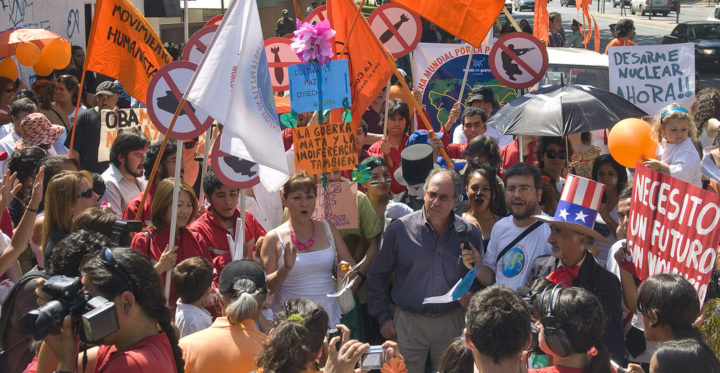Pressenza: It seems that the legal process will begin for the approval of the Treaty on the Prohibition of Nuclear Weapons in Chile. It is one of the most eagerly awaited treaties by all of us who, eleven years ago now, marched around the world and called for nuclear disarmament and an end to this type of armament. You were then the Latin American spokesperson for the World March for Peace and Nonviolence. As a Chilean MP, have you had anything to do now, with the possible processing of this project?
Tomás Hirsch: Finally, after a long time, years in fact, and after making countless efforts, today the President of Chile has finally sent to Congress the Draft Agreement approving the Treaty on the Prohibition of Nuclear Weapons, which was adopted in New York on 7 July 2017.
This Treaty is very meaningful to all humanists throughout the world. Humanism has always promoted active non-violence as a way of resolving conflicts and has rejected nuclear weapons because of the threat they pose to humanity. Several years ago, Silo, in a short video that traveled around the world and was projected on the screens of hundreds of television channels, even on city walls, train stations, and airport screens, called for the dismantling of the world’s nuclear arsenals.
It has certainly taken leaders, especially of the great powers, to understand the need, the urgency, the importance of removing this threat to all humanity. That is why we have been pleased every time a country ratifies this Nuclear Weapons Ban Treaty.
In the case of Chile, we have been insisting for a long time that the government present the Draft Agreement to the Chamber of Deputies so that it can be ratified. We have spoken to several foreign ministers, to the Ministers of Defence, to the Minister-Secretary-General of the Presidency, who coordinates the government’s entire legislative agenda, and we have asked the Foreign Affairs Committee of the Chamber of Deputies and the Senate Committee to do so.
And well, in the end this worked. It is a reason for great joy for all of us, particularly for me. As Latin American Spokesperson for the World March for Peace and Nonviolence, I was promoting nuclear disarmament and assessing what it means for Latin America to have the Treaty of Tlatelolco, which in some way was a precursor in the quest for nuclear disarmament.
Today is a day of great joy. In some way, we collaborated in something. I think we put a little drop to help this project to be processed, which – I hope now – will advance rapidly in the Chilean Congress.
Pressenza: What steps will the procedure have to take and what deadlines are more or less estimated for its approval?
Tomás Hirsch: Normally, bills have a slow, long and bureaucratic process. They go through a Commission in the Chamber of Deputies, then they go to the plenary session of the Chamber of Deputies, back to the Commission, back to the plenary session. This is then repeated in the Senate, Commission, Commission, plenary session, back to the Chamber of Deputies and if there are differences, it ends up in what is called a Joint Commission.
In this case, since it is a single article and a Draft Agreement, which does not allow for any indications or modifications, I believe and hope that it will move forward quickly. Personally, I will participate in the sessions of the Foreign Relations Commission, seeking to position and install the vision that we have from Humanism in this regard, and hopefully, contribute so that this is approved as quickly as possible.
Pressenza: We know that the International Treaty for the Prohibition of Nuclear Weapons, which was promoted by ICAN together with many peace and disarmament organizations, and which was signed by the necessary number of countries, will come into force on 22 January. How do you see Chile, which already belongs to the group of countries governed by the Treaty of Tlatelolco, in terms of being an agent in favor of disarmament? Is there a culture in the country that favors it? What actions could be necessary to strengthen it or generate it?
Tomás Hirsch: It is not easy to understand why Chile has taken so long, as it is a signatory of the Treaty of Tlatelolco, a country that does not have nuclear weapons, has not stored them in its territory, and prohibits transit through its territory.
I believe therefore that there is a culture, a history, and tradition in Chile that favors the approval of this Treaty, that Chile is one of the signatory countries, and that in this way this Treaty can advance, hopefully with the signature of every country in the world.
By the way, it is not enough for Congress to have to discuss it in its committees; here, citizen pressure is very important. Hopefully, there will be articles, opinion columns, and social networks will be active, so that this does not continue to be delayed and, finally, it will have the unanimous support of all members of parliament in our country.
Translated by Jon Swinden












